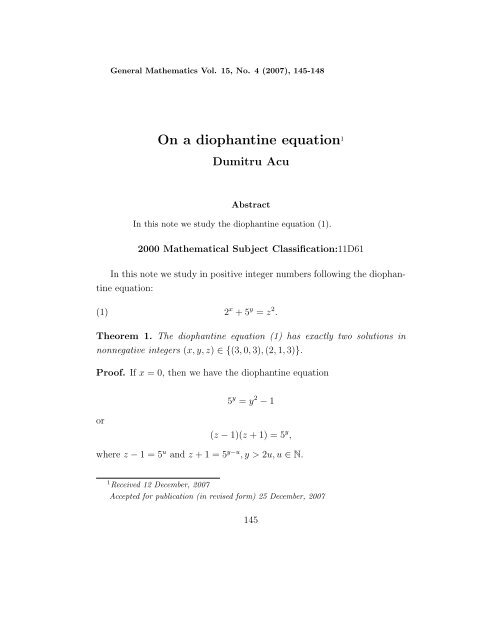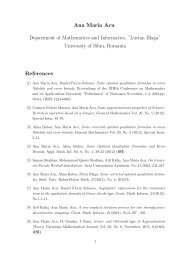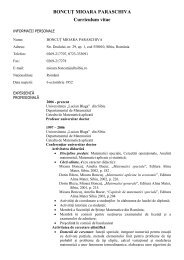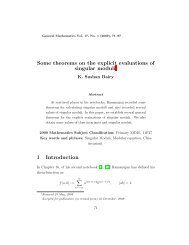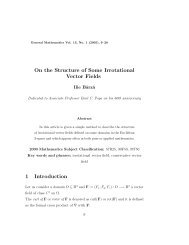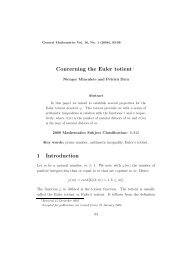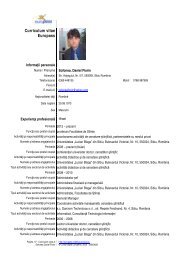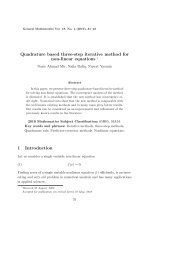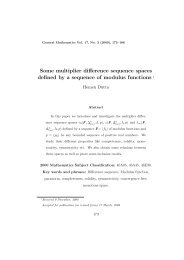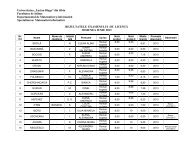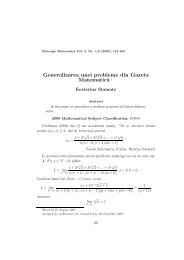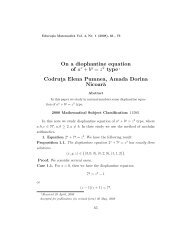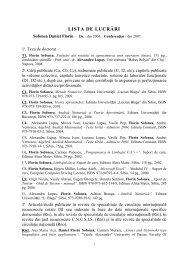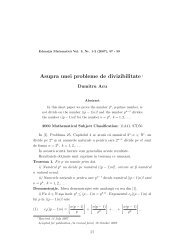On a diophantine equation
On a diophantine equation
On a diophantine equation
You also want an ePaper? Increase the reach of your titles
YUMPU automatically turns print PDFs into web optimized ePapers that Google loves.
General Mathematics Vol. 15, No. 4 (2007), 145-148<br />
<strong>On</strong> a <strong>diophantine</strong> <strong>equation</strong> 1<br />
Dumitru Acu<br />
Abstract<br />
In this note we study the <strong>diophantine</strong> <strong>equation</strong> (1).<br />
2000 Mathematical Subject Classification:11D61<br />
In this note we study in positive integer numbers following the <strong>diophantine</strong><br />
<strong>equation</strong>:<br />
(1) 2 x + 5 y = z 2 .<br />
Theorem 1. The <strong>diophantine</strong> <strong>equation</strong> (1) has exactly two solutions in<br />
nonnegative integers (x,y,z) ∈ {(3, 0, 3), (2, 1, 3)}.<br />
Proof. If x = 0, then we have the <strong>diophantine</strong> <strong>equation</strong><br />
5 y = y 2 − 1<br />
or<br />
(z − 1)(z + 1) = 5 y ,<br />
where z − 1 = 5 u and z + 1 = 5 y−u ,y > 2u,u ∈ N.<br />
1 Received 12 December, 2007<br />
Accepted for publication (in revised form) 25 December, 2007<br />
145
146 Dumitru Acu<br />
From here,we obtain:<br />
5 y−u − 5 y = 2<br />
or<br />
5 u (5 y−2u − 1) = 2,<br />
where u = 0 and 5 y = 3, which is impossible.<br />
If y = 0, then we have the <strong>diophantine</strong> <strong>equation</strong><br />
z 2 − 1 = 2 x<br />
or<br />
(z − 1)(z + 1) = 2 x ,<br />
where z − 1 = 2 v and z + 1 = 2 x−v ,x > 2v,v ∈ N.<br />
Form here, we obtain<br />
2 x−v − 2 v = 2<br />
or<br />
2 v (2 x−2v − 1) = 2,<br />
where v = 1 and 2 x−2 = 2, that is v = 1 and x = 3.<br />
Therefore x = 3,y = 0,z = 3.<br />
Now, we consider x ≥ 1 and y ≥ 1.<br />
It follows from (1) that the number z is odd and it is not divisible by 5.<br />
If z ≡ ±1(mod 5) then we have z 2 ≡ 1(mod 5) and if z ≡ ±2(mod 5) it<br />
results z 2 ≡ 4(mod 5)≡ −1(mod 5).<br />
But, we have<br />
2 2k = 4 k = (5 − 1) k ≡ (−1) k (mod 5)<br />
and<br />
2 2k+1 = 2 · 4 k ≡ 2 · (−1) k (mod 5),k ∈ N.<br />
It results that the number x is even.
<strong>On</strong> a <strong>diophantine</strong> <strong>equation</strong> 147<br />
Now, we consider x = 2k,k ∈ N .From (1) we have<br />
z 2 − 2 2k = 5 y<br />
or<br />
(z − 2 k )(z + 2 k ) = 5 y ,<br />
where z − 2 k = 5 w and z + 2 k = 5 y−w ,y > 2w. From here, we obtain<br />
5 w (5 y−2w − 1) = 2 k+1<br />
which implies w = 0 and<br />
(2) 5 y − 2 k+1 = 1.<br />
The <strong>diophantine</strong> <strong>equation</strong> (2) is a <strong>diophantine</strong> <strong>equation</strong> by Catalan’s<br />
type<br />
a b − c d = 1<br />
which has in positive integer numbers (> 1) only the solutions a = 3,b =<br />
2,c = 2 and d = 3([3], [6], [7]) .<br />
It results the <strong>diophantine</strong> <strong>equation</strong> (2) has the solution only if y = 1.<br />
Then we have 2 k+1 = 2 2 , where k = 1. Therefore x = 2,y = 1,z = 3.<br />
In concluding, the <strong>diophantine</strong> <strong>equation</strong> (1) has the solutions:(x,y,z) ∈<br />
{(3, 0, 3), (2, 1, 3)}.<br />
References<br />
[1] Andreescu, T., Cercetări de analiză diofantică şi aplicaţii, Teza de doctorat,<br />
2003, Timisoara (in Romanian).<br />
[2] Andreescu, T., Andrica, D., O introducere în studiul ecuaţiilor diofantiene,<br />
Ed. GIL, 2002 (in Romanian).<br />
[3] Cucurezeanu, I., Ecuaţii în numere întregi, Ed. Aramis, Bucuresti,2006(in<br />
Romanian).
148 Dumitru Acu<br />
[4] Cucurezeanu, I., Pătrate şi cuburi perfecte de numere întregi, Ed.<br />
GIL,2007(in Romanian).<br />
[5] Mordell, L.J., Diophantine Equations, Academic Press, London, New<br />
York, 1969.<br />
[6] Sierpinski, W., Elementary theory of numbers, Warszawa, 1964.<br />
[7] Sierpinski, W., Ce ştim şi ce nu ştim despre numerele prime, Ed.<br />
Ştiinţifică, Bucureşti, 1996(in Romanian).<br />
Department of Mathematics,<br />
Faculty of Sciences,<br />
University ”Lucian Blaga” of Sibiu,<br />
Dr. Ion Ratiu 5-7, Sibiu, 550012, Romania<br />
E-mail: acu dumitru@yahoo.com


